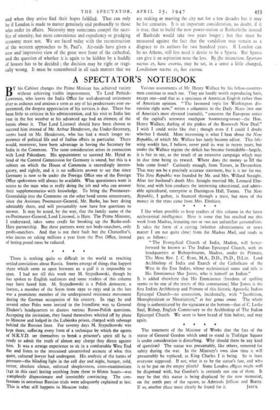There is nothing quite so difficult in the world as
reaching settled convictions about Russia. Stories emerge of things that happen there which seem to open between us a gulf it is impossible to span. I had not till this week met M. Stypulkowski, though he has spoken to English audiences and some readers of this column may have heard him. M. Stypulkowski is a Polish democrat, a lawyer, a member of the Seym from 1930 to 1935 and in the late war a prominent member of the underground resistance movement during the German occupation of his country. In 1945 he and several other Poles were invited in the friendliest way to General Zhukov's headquarters to discuss various Russo-Polish questions. Accepting the invitation, they found themselves whirled off by plane to Moscow and lodged in the Lubianka prison, charged with sabotage behind the Russian lines. For seventy days M. Stypulkowski was kept there, suffer:fig every form of a technique by which the agents of N.K.V.D. set themselves to- break a prisoner's spirit till he is ready to admit the truth of almost any charge they direct against him. It was a strange experience to sit in a comfortable West End flat and listen to the restrained unvarnished account of what this quiet, cultured lawyer had undergone. His analysis of the forms of pressure—the blinding light in the cell day and night, hunger, told, terror; absolute silence, enforced sleeplessness, cross-examinations (141 in this case) lasting anything from three to fifteen hours—was completely dispassionate and irresistibly convincing. The con- fessions in notorious Russian trials were adequately explained at last. This is what still happens in Moscow today.


































 Previous page
Previous page